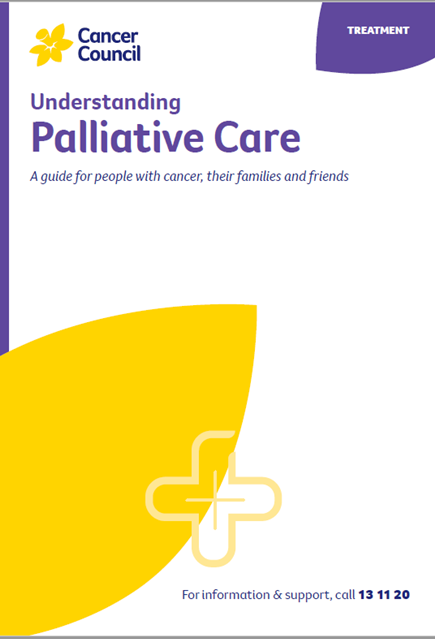- Home
- Cancer Information
- Advanced cancer
- Palliative care
- Common questions about palliative care
- Where can I have palliative care?
Where can I have palliative care?
You can have palliative care in different places, including:
- your own home or a family member’s home
- at a residential aged care facility or other out-of-home facility
- in a hospital
- at a specialist palliative care unit (sometimes called a hospice)
- at an outpatient clinic or via telehealth.
An important role for your GP or the palliative care team is to work out the best place for your care. They will consider your care needs, your home environment, your support networks, and what organisations and individuals are available in your area to help you, and then discuss the possibilities with you, your family and carers.
Choosing the right setting
You may be able to choose where you want to receive palliative care, or you may be able to alter arrangements as your needs change. Your choices may depend on what services are available in your area. If you accept palliative care at an inpatient facility, you can still decide to go back home if circumstances allow.
Home-based palliative care
Many people want to receive care at home because it is a familiar environment close to family and friends. If you are cared for at home, you (and anyone who cares for you) may be able to receive community-based palliative care services. This can include a range of services on an occasional or regular basis.
Depending on your situation, it may not be possible to stay at home, even with home help. Hospitals and palliative care units are designed for short-term stays, to address worsening symptoms, to plan care at home or for people nearing end of life.
If you cannot return home and need care for several months or more, the palliative care team will talk to you and your carers about where you can receive ongoing care, such as a residential aged care facility.
I just have to live my life day by day. I can’t predict my future. I can’t plan things in the future. But what I can do is love every day and I truly do.
ANNE
→ READ MORE: Do I have to pay for palliative care?
Podcast for people affected by advanced cancer
Listen now
More resources
Prof Meera Agar, Palliative Care Physician, Professor of Palliative Medicine, University of Technology Sydney, IMPACCT, Sydney, NSW; Anne Booms, Nurse Practitioner, Palliative Care, Icon Cancer Centre Midlands, WA; Nicola Champion, Consumer; John Clements, Consumer; Dr Alexandra Clinch, Palliative Medicine Specialist and Deputy Director, Palliative Care, Peter MacCallum Cancer Centre and Royal Melbourne Hospital, VIC; A/Prof Jaklin Eliott, School of Public Health, University of Adelaide, SA; Dr Jemma Gilchrist, Clinical Psychologist, Mind My Health, NSW; McCabe Centre for Law and Cancer, VIC; Caitlin MacDonagh, Clinical Nurse Consultant, Palliative Care, Royal North Shore Hospital, NSW; Dr Roya Merie, Radiation Oncologist, Icon Cancer Centre, Concord, NSW; Dr Deidre Morgan, Research Centre for Palliative Care, Death and Dying, Flinders University, SA; Caitriona Nienaber, 13 11 20 Consultant, Cancer Council WA; Palliative Care Australia.
View the Cancer Council NSW editorial policy.
View all publications or call 13 11 20 for free printed copies.



